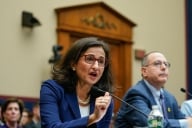You have /5 articles left.
Sign up for a free account or log in.
Standardized teacher training for all new academics has been emphatically rejected by British academics after it was proposed by the Higher Education Academy.
The teaching and learning organization launched a consultation on its career-development proposal, the UK Professional Standards Framework, last November. It said at the time that it "strongly recommended" that all new academic staff "be required" to complete an HEA-accredited teaching program, such as the postgraduate certificate in higher education.
It also said that all postgraduates who teach should undertake training, that existing staff should be "offered opportunities" to do a PGCHE or the equivalent, and that classroom observation should become part of any teaching qualification.
But the HEA’s report on the consultation, published this week, reveals that more than 70 percent of respondents oppose compulsory discipline-based teaching qualifications. Mandatory teaching observations and mentor ideas are also rejected, with the sector stressing that such practices should be left to individual institutions.
The revised professional standards framework makes no mention of obligatory teacher training. The HEA claimed that the ideas floated in the consultation document were intended to "test the appetite of the sector" and were "related to, but not part of" the framework.
Craig Mahoney, the HEA’s chief executive, has made clear his belief that academics should have some form of teaching qualification. Writing in Times Higher Education in July, he said there was “broad general support for the principle that those who teach in higher education should be appropriately qualified”.
"What is ripe for debate," he added, "is how this might operate in practice."
Julie Hall, co-chair of the Staff and Educational Development Association, said that many in the sector had been "really cross" at what they perceived as the HEA’s attempt to "dictate" how training should be conducted. "Many people were opposed to the more radical and intrusive elements of the recommendations," she said. "Universities have designed their own programs over the past 20 years in this area, so this sounded like the HEA was telling institutions what to do. We are glad it has listened to us – a one-size-fits-all approach will not work."
Those to voice opposition to compulsory discipline-based teaching modules include the Higher Education Funding Council for England, which says in its consultation response that the HEA "should not prescribe how institutions (and other providers) develop academics’ discipline-based teaching expertise."
One university, which is not named in the HEA report, warns in its submission that "discipline-specific modules create mental silos and are a retrograde step," while another institution adds that the definitions laid down are "too constricting."
Mahoney said the consultation had made the sector’s position clear. "Institutions were fairly adamant that autonomy must be maintained," he said. But he added that "while there is no mandate to see [teacher training] become a requirement, if the sector does not take this issue by the horns, this is something that might soon become a requirement."








